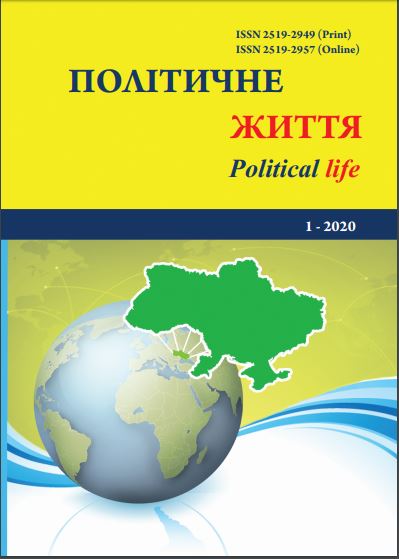Сучасні авторитарні політичні режими регіону Тропічної Африки та перспективи їх демократизації.
DOI:
https://doi.org/10.31558/2519-2949.2020.1.5Ключові слова:
Тропічна Африка, авторитарний режим, диктатура, конфліктогенність, демократичний транзит, стабілізація політичного життяАнотація
В статті поданий аналіз сучасних авторитарних режимів, які утвердилися в регіоні Тропічної Африки в постколоніальний період, коли незалежні держави в результаті тривалої національновизвольної боротьби мали сподівання на стабілізацію політичного життя й підвищення соціальноекономічних стандартів. Актуальність теми дослідження умотивована тим фактом, що досліджувані в межах статті ознаки авторитарності державно-політичного устрою, характерні для означеного регіону, є спільними і притаманні більшості країн Африканського континенту в цілому, що уможливлює розширення аналітичного матеріалу для відповідних узагальнень.
Мета статті полягає в аналізі авторитарних політичних режимів країн Тропічної Африки та виокремленні суспільних умов і обставин, сприятливих для демократичного транзиту.
В результаті опрацювання теми схарактеризовано різновиди конфліктогенності як основної дестабілізуючої причини демократичного транзиту в поставторитарних державах регіону, що привносить додаткові ризики у виборі адекватного шляху політичного розвитку й утримання культурної самобутності.
Розкрито такі гальмівні чинники демократичного транзиту, як персоніфіковані та однопартійні режими, легітимізовані етнодиктатури, система пропаганди, спрямована на утвердження переконання непридатності демократії для Африканського континенту.
До сприятливих умов демократизації, специфічних для регіону, віднесено: домінування персоніфікованих режимів, що тримаються на лідерах, усунення яких прискорює їх демонтаж; економічні кризи, що мотивують владу до отримання міжнародної допомоги, однією з умов її отримання є демократизація політичного режиму; роль «арабської весни» як прецедента політичних змін для континенту та ін.
Посилання
Головченко В. І., Кравчук О. А. Країнознавство: Азія, Африка, Латинська Америка, Австралія і Океанія. Навчальний посібник. Київ: ЗАТ «Нічлава», 2006. С. 216 – 232.
Добронравин Н.А., Илянин В.В., Маслов А.А. Зигзаги непредсказуемого развития: Нигерия, Ангола, «Нефтяные Эмираты» Гвинейского залива. Регионы и страны. URL: docplayer.ru/26775265-html (дата звернення 03.01.2020 р.)
Мала енциклопедія етнодержавознавства. НАН України. Інститут держави і права ім. В.М. Корецького. Київ: Довіра: Генеза, 1996. 942 с.
Мир цвета хаки. Вооруженные силы в системе государственной власти. Под ред. А. Горбунова. Москва: Центр анализа стратегий и технологий, 2011. С.34 – 56. 286 с.
Названы худшие диктаторы мира. URL: http://www.liveinternet.ru/users/2503040/post135531057/ (дата звернення: 21.10.2019 р.)
Наумкіна С. «Третя хвиля» демократизації: підсумки і перспективи. Український центр політичного менеджменту. URL: http://www.politik.org.ua/vid/magcontent.php3?m=1&n=24&c=303 (дата звернення: 12.01.2020 р.)
Огест Г. «Весна» Чорної Африки? Український тиждень. Світ у 2012. Київ: ТОВ «СКІМП», 2011. С. 66 – 67.
Engels, Bettina. (2018). A stolen revolution: popular class mobilisation in Burkina Faso. Labor History, 2018, 60, 110 – 125.
Reyntjens, Filip. Briefing: The Democratic Republic of Congo, from Kabila to Kabila. African Affairs, 2001, 100.
Prinsloo, Jeanne. News constructs of customary identity versus democratic practice: the case of Lindiwe Dlamini and Mswati III of Swaziland. Communicatio, 2007, 33. 77 – 95.

